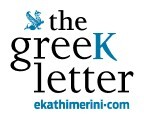 |
Look Upon My Works, Ye Mighty [InTime News] [InTime News]
Welcome to the weekly round up of news by Kathimerini English Edition. SYRIZA, the party whose electoral victory in 2015 in the midst of the debt crisis sent shockwaves across Europe, is no longer the official opposition party, sliding to third place for the first time since 2012. A further two MPs announced their decision to leave SYRIZA this week, leaving the party with just 29 parliamentarians out of the 47 elected in June 2023. This means that third-placed PASOK has leapfrogged SYRIZA and will now serve as the country’s official opposition. This collapse of the official opposition party, which is facing its second major division since the 2023 national elections, is unprecedented in Greece’s parliamentary history. The Speaker of the Hellenic Parliament Konstantinos Tasoulas noted that the provisions for this transfer of institutional power “have never been used before”. SYRIZA officials will be anxiously awaiting to see the total participation in the first round of its leadership election being held today, hoping that it will prove to be a breath of life for the beleaguered party as it was in the case of PASOK where the mass turnout (more than 300,000) seemed to revitalize the party. “On Monday, SYRIZA will press the reset button” said leadership hopeful Sokratis Famellos, while fellow candidate Pavlos Polakis stated that “on Monday, we will begin the counterattack”. The two are expected to be the two frontrunners who will head to the run-off next Sunday. At the same time, expelled leader Stefanos Kasselakis unveiled his new party, Movement for Democracy, on Saturday. Kasselakis, whose victory in the leadership election last year marked the beginning of SYRIZA’s internecine strife, outlined his political vision, stating that “we aim to be the return of true democracy to the country that gave birth to it”. However, it is worth noting that the party can only institutionally be represented in parliament as such if it surpasses a minimum ten-seat threshold. Currently, the six lawmakers who left SYRIZA in support of Kasselakis will have to sit as independents despite their affiliation with him. Spotlight
|
MUST READS
|
 [InTime News] [InTime News]The rift inside ruling New Democracy continued to make headlines last week. Speaking at a book presentation in Patras, Former Prime Minister Kostas Karamanlis kept his distance from the government and took issue with the recent expulsion from ND of former PM and his successor at the helm of the Conservatives, Antonis Samaras, while calling for unity, both inside the party as well as on the broader national level. He made known his disagreement with the expulsion of Samaras by noting that “divergent opinions, even intense criticism, should not be demonized. Nor should they be dealt with through disciplinary measures, which only make the necessary national unity to support the national strategy more difficult”. Following a different approach from Samaras, in terms of both substance and rhetoric, he navigated the fine line between being critical, but at the same time remaining a major personal and ideological pillar of New Democracy, the party founded half a century ago by his uncle Constantine Karamanlis. As has been the case before, Karamanlis’ criticism was measured. Avoiding direct confrontation allows him to continue to signal his opposition to many government policies, on both the domestic and foreign fronts, while maintaining the heavy influence he commands on a considerable number of deputies and a large portion of the ruling party’s voters. Addressing developments in Europe, he voiced his concern over what he called “unrestrained rights movements” undermining traditional values and identity, and in that way, he appealed to the conservative base of the party. On relations with Turkey, he criticized the latter for raising “arbitrary and unfounded” claims, including those related to sovereignty and demilitarization of islands. He put an emphasis on approaching all these issues on the basis of international law, while at the same time noting that Turkey’s behavior makes necessary the “build-up of strong armed forces, credible deterrent capabilities, an active multidimensional foreign policy, clear messages to all, and, above all, national unity and consensus”. Last, but not least, he ruled out a presidential role for himself, which was brought to the forefront by Samaras who in a recent interview had suggested that Karamanlis would be the perfect choice for head of state. Karamanlis declared that “while the suggestion honors me, I must clarify that the matter neither concerns nor interests me.” It remains to be seen if his stance on the issue will help or further weaken the government. |
 The very high, and rising, temperatures in Greece during the summer months are beginning to shift international travel from the traditional peak months of July and August to the months bookending this period (May, June, September). The latest data published by the Bank of Greece show a 6.6% increase in the number of visitors to Greece and a 7.9% increase in travel receipts in September year-on-year. In fact, the proportionately higher increase in receipts indicates that travellers are likely spending more time per stay. This is important because, while the number of visitors had increased during the peak months, overall receipts in July and August were down. This is likely because, due to the adverse weather conditions in the summer, visitors were likely to have been mostly young people who visit for fewer days and are more careful with their expenses. The very high, and rising, temperatures in Greece during the summer months are beginning to shift international travel from the traditional peak months of July and August to the months bookending this period (May, June, September). The latest data published by the Bank of Greece show a 6.6% increase in the number of visitors to Greece and a 7.9% increase in travel receipts in September year-on-year. In fact, the proportionately higher increase in receipts indicates that travellers are likely spending more time per stay. This is important because, while the number of visitors had increased during the peak months, overall receipts in July and August were down. This is likely because, due to the adverse weather conditions in the summer, visitors were likely to have been mostly young people who visit for fewer days and are more careful with their expenses. |

|
| “The Athens Exchange (ATHEX) general index closed at 1,401.58 points, down 0.16% from last week.” |
| “The Finance Ministry will continue its current efforts to reduce tax evasion in Greece by introducing a new round of measures in 2025, with a focus on implementing digital tools to ensure tax compliance. The ministry estimates that its current measures have led to a 1.8 billion euro growth in Greece’s tax revenues.” |
| “Greece is set to seek to raise more than 11 billion euros from the bond markets next year, following the latest upgrades from the major credit rating agencies. The state’s net borrowing in 2025 is expected to be almost double this year’s.” |
|
Editor's Pick This is more than just a quaint addition to the various interventions of the former premier. The main issue here is that he creates false realities in order to defend himself and/or to fightRead the article This is more than just a quaint addition to the various interventions of the former premier. The main issue here is that he creates false realities in order to defend himself and/or to fightRead the article |
| We’d like to hear from youShare your feedback at newsletters@ekathimerini.com |
| Did you receive this email from a friend?Subscribe to our newsletters here |
 |
| Kathimerini English Edition is published as a single paper with the International Edition of NYTimese |



No comments:
Post a Comment